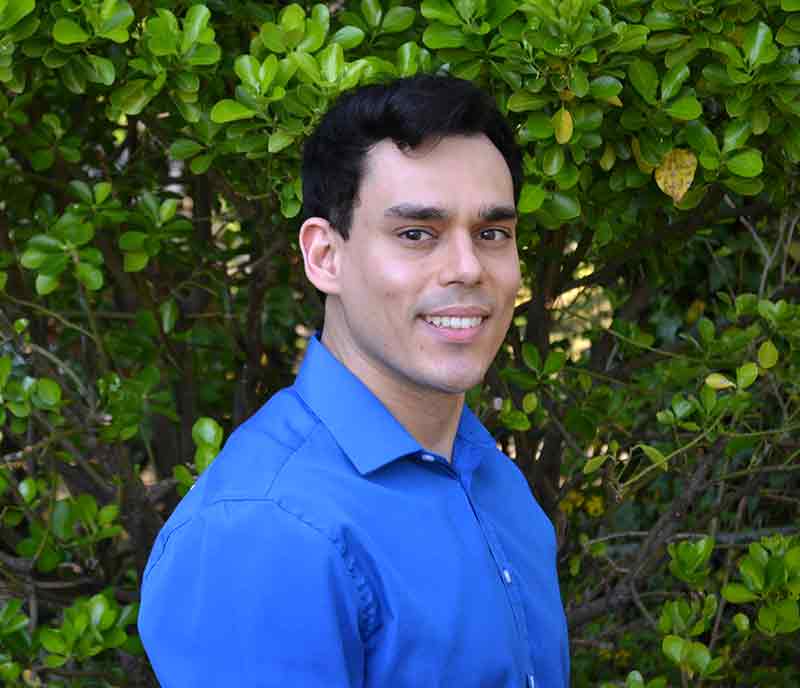Meet a Participant: Gustavo Varela-Alvarenga

As a participant in the National Science Foundation’s (NSF) Mathematical Sciences Graduate Internship (MSGI) Program, doctoral student Gustavo Varela-Alvarenga used machine learning methods to study novel alloys. Photo Credit: Gustavo Varela-Alvarenga
Doctoral statistics student uses artificial intelligence to improve energy systems
With the continual development of new technology and economic growth, global energy consumption has followed an increasingly upward trend. According to the U.S. Energy Information Administration, fossil fuels account for sixty-three percent of U.S. electricity generation, while nuclear resources account for only nineteen percent. Researchers currently face the hard task of developing methods that meet growing energy demands while also minimizing the environmental impact.
One way to potentially decrease fuel consumption and harmful emissions while still meeting energy demands is to increase the operating temperature of fossil fuel energy systems, which would allow higher efficiency to be achieved. However, while increasing energy output is favorable, higher temperatures affect the integrity of the structural material itself, shortening its overall operating lifetime. To achieve safe and stable increased energy output, new heat exchanger materials that can withstand higher temperatures need to be developed.
In summer 2019, doctoral student Gustavo Varela-Alvarenga spent 10 weeks researching methods to simulate new compositions of alloys that would allow them to withstand these necessary changes for use in fossil fuel energy systems. His research was conducted as part of the National Science Foundation’s (NSF) Mathematical Sciences Graduate Internship (MSGI) Program, which provides research opportunities for mathematical sciences doctoral students. NSF MSGI seeks to provide hands-on experience for the use of mathematics in nonacademic settings at national laboratories, industries and other facilities.
For his internship, Varela-Alvarenga was stationed at the Pacific Northwest National Laboratory located in Richland, Washington. There he joined the Reactor Materials and Mechanical Design group and conducted research in support of the Department of Energy’s (DOE) Fossil Energy eXtreme MATerials (XMAT) project. The XMAT project aims to accelerate novel alloy research by using machine learning and data science along with computer simulations and experiments to reduce the time to material discovery. With these techniques, DOE hopes to push alloy development away from the current "Edisonian Approach,” which is characterized by trial and error discovery, toward a faster approach to the design of new materials.
Under the guidance of his mentor, Ram Devanathan, Ph.D., Varela-Alvarenga studied machine learning methods in order to identify the best methods to analyze novel alloy micrographs. These micrographs, or microscopic pictures, captured the behavior of alloy microstructures after they were placed under extreme conditions. Examining alloy micrographs helps researchers identify defects and precipitates in the material, which indicate if the alloy is capable of withstanding extreme temperatures.
Varela-Alvarenga collected micrographs for study by coding a program that collected data from the University of Cambridge’s Dissemination of IT for the Promotion of Materials Science (DoITPoMS) site that houses micrographs and related metadata. He also developed a centralized database management system to collect and store the data he gathered. To add more information to this database system, he created a web application to gather data from other researchers.
“The goal of the web application was to create a friendly way for researchers to input information regarding experiments on alloys and save it to a shareable database,” said Varela-Alvarenga. “I wanted to provide researchers with structured and standardized databases, because it saves time and resources when everyone is on the same page regarding the information there.”
Varela-Alvarenga’s research laid important groundwork for future research and experiments on novel alloy use in fossil fuel systems. A typical day for Varela-Alvarenga involved studying machine learning methods and how to apply them to image classification, collaborating with teammates, and writing code for the web crawler, web application and database management system.
Throughout the course of his internship, Varela-Alvarenga developed many new skills in machine learning methods and the Python programming language, two skillsets currently in high demand for data scientists. He describes the experience he gained as invaluable and recommends the program to others considering a career in statistical research.
“My internship was an excellent opportunity to collaborate with other brilliant researchers,” said Varela-Alvarenga. “It also took me out of my comfort zone by placing me in an area that uses a type of data that I've never worked with before. The challenge was exciting.”
Varela-Alvarenga received his bachelor’s degree in statistics from the Universidade de Brasília, Brazil, in 2008, followed by his master’s degree in economics in 2011. He is currently working toward his doctoral degree in mathematical statistics at the University of Maryland, College Park.
The NSF MSGI Program is funded by NSF and administered through the U.S. Department of Energy’s (DOE) Oak Ridge Institute for Science and Education (ORISE). ORISE is managed for DOE by ORAU.


